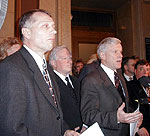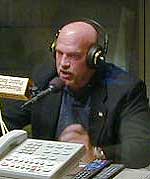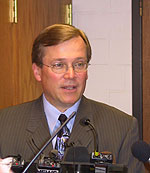Legislative leaders reach a budget deal
By Laura McCallum
Minnesota Public Radio
February 19, 2002
Three weeks into the 2002 session, legislative leaders say they've reached a deal to balance the budget. The agreement uses one-time money and spending cuts to address the nearly $2 billion projected budget deficit. The deal could still hit major snags; House DFLers have not signed on, and Gov. Ventura could veto it.
| |
|
|
|
||
The budget-balancing plan uses the state's budget reserve, more than half of the cash flow account and other sources of one-time money. It includes permanent spending cuts of $374 million, and one-time cuts of $131 million, including the cancellation of a St. Paul busway.
House Republicans, Senate Democrats and Senate Republicans have endorsed the plan. DFL Senate Majority Leader Roger Moe of Erskine says the Legislature accepted Gov. Ventura's challenge to tackle the deficit right away.
"It's important, we think, to solve our differences as quickly as possible so that we can resolve the uncertainty among Minnesotans. The sooner we act, the sooner our state can begin its economic recovery," Moe said.
Republican House Speaker Steve Sviggum of Kenyon says Gov. Ventura should join the three caucuses in backing the plan.
"I have no idea why the governor would not agree with this. I have zero idea why he would not agree with it. I would give him my humble advice, my humble direction that he ought to sign this bill, he ought to take it with the good-faith first installment that it is," Sviggum said.
But the governor doesn't see it that way, according to spokesman John Wodele. Wodele says the governor is concerned that the deal has no plan to replenish the state's budget reserves, which could jeopardize Minnesota's triple-A bond rating.
| |
|
|
|
||
It also begins to balance the budget for the next two-year budget cycle by not taking inflation into account. Prior to the announcement of the deal, Ventura said on MPR's Midday that legislators can't ignore inflation.
"They're just using... the old shell game, they're shifting and using smoking mirrors to try to say they're not going to cut, when if you don't factor in inflation - and let me put this out too, if there's no inflation, that means you're still in a recession," said Ventura.
Ventura was not involved in the legislative negotiations. Spokesman Wodele says he couldn't say whether the governor would veto the plan when it lands on his desk. The bill is on the fast track, and could be ready for a floor vote in both the House and Senate later this week. House and Senate leaders have the votes to pass the plan, but don't yet have a veto-proof majority if Ventura would decide to reject it. It takes two-thirds of the Legislature to override a gubernatorial veto.
House DFLers don't like the nearly $70 million worth of cuts in K-12, early childhood and higher education. Minority Leader Tom Pugh of South St. Paul says the decision not to join with the other three caucuses gives House DFLers more leverage than they typically have.
| |
|
|
|
||
"We are empowered for one of those rare opportunities in my three-year career in the minority, and we should exercise that to help our schools," Pugh said.
Pugh says he thinks there's still time to eliminate the education cuts in the plan. If that happens, Pugh says his caucus would likely sign on to the deal. Some lawmakers question the rush to push the bill through so early in the session. Pugh says he thinks one factor is the gubernatorial aspirations of House Majority Leader Tim Pawlenty and - possibly - Senate Majority Leader Roger Moe, who would both like to take credit for quick action on the budget.
Legislative leaders deny that politics played a role in the timing of the deal, but there's no denying that no one can recall a budget agreement this early in the process.
More from MPR


